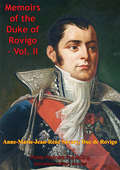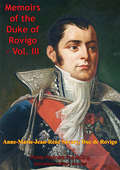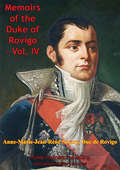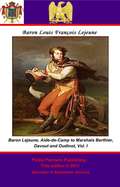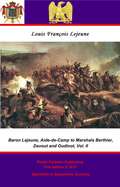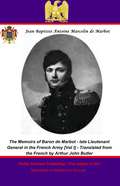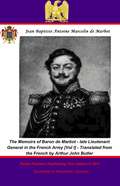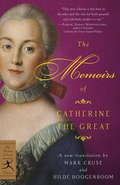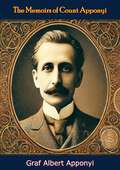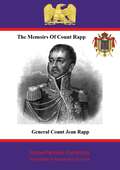- Table View
- List View
The Memoirs Of Duke Of Rovigo Vol. II (The Memoirs of Duke of Rovigo #2)
by Anne Jean Marie René Savary Duke of RovigoAs the tide of the French revolution swept away the noble privileges many of high birth fled the country, some officers stayed despite the danger of the revolutionaries, including both Napoleon and Anne-Jean-Marie-René Savary, loyal to the state and sniffing advancement. Savary enlisted as a volunteer and was posted to the Armies of the Sambre and Meuse rivers and then the Rhine, his distinguished services led him to selected as an aide-de-camp of General Desaix who was known as a shrewd judge of characters both of men and of soldiers. It was in the sands of the desert during the Egyptian Campaign in 1798 that Savary met Napoleon he would serve faithfully for the next 17 years in the almost unbroken conflict that scarred Europe. He served admirably with his old commander Desaix during the Italian Campaign in 1800, after Desaix fell at the battle of Marengo Napoleon decided to take Savary into his confidence and appointed him head of his bodyguard. Promoted to Général de Division in 1805 shortly before the Austerlitz campaign. Once again he displayed great gallantry and courage during the fighting, but Napoleon saw that his abilities were also of use away from the field, and started to use him as a diplomat upon who he could always rely. After further missions, particularly in intrigues in Spain, Savary was appointed Minister of Police in 1810, he discharged his duties with a zeal that would not have been out of place in the Spanish Inquisition but was at fault during the attempted coup d'état of General Malet in 1812 whilst the Grande Armée was struggling through the snows of Russia. He served on as a faithful servant of Napoleon until the bitter end after Waterloo in 1815, and was considered dangerous enough to be refused permission to go the Elba with his former master. The Second Volume resumes with the 1807 campaign in Prussia, the invasion of Spain 1808, the 1809 campaign in Austria, the Peninsular War and his appointment to the Ministry of Police.
The Memoirs Of Duke Of Rovigo Vol. III (The Memoirs of Duke of Rovigo #3)
by Anne Jean Marie René Savary Duke of RovigoAs the tide of the French revolution swept away the noble privileges many of high birth fled the country, some officers stayed despite the danger of the revolutionaries, including both Napoleon and Anne-Jean-Marie-René Savary, loyal to the state and sniffing advancement. Savary enlisted as a volunteer and was posted to the Armies of the Sambre and Meuse rivers and then the Rhine, his distinguished services led him to selected as an aide-de-camp of General Desaix who was known as a shrewd judge of characters both of men and of soldiers. It was in the sands of the desert during the Egyptian Campaign in 1798 that Savary met Napoleon he would serve faithfully for the next 17 years in the almost unbroken conflict that scarred Europe. He served admirably with his old commander Desaix during the Italian Campaign in 1800, after Desaix fell at the battle of Marengo Napoleon decided to take Savary into his confidence and appointed him head of his bodyguard. Promoted to Général de Division in 1805 shortly before the Austerlitz campaign. Once again he displayed great gallantry and courage during the fighting, but Napoleon saw that his abilities were also of use away from the field, and started to use him as a diplomat upon who he could always rely. After further missions, particularly in intrigues in Spain, Savary was appointed Minister of Police in 1810, he discharged his duties with a zeal that would not have been out of place in the Spanish Inquisition but was at fault during the attempted coup d'état of General Malet in 1812 whilst the Grande Armée was struggling through the snows of Russia. He served on as a faithful servant of Napoleon until the bitter end after Waterloo in 1815, and was considered dangerous enough to be refused permission to go the Elba with his former master.The Third Volume continues with his service in the Ministry of Police, the continuing Peninsular War, the coup d'état of General Malet and the retreat of the French Army in 1813-1814.
The Memoirs Of Duke Of Rovigo Vol. IV (The Memoirs of Duke of Rovigo #4)
by Anne Jean Marie René Savary Duke of RovigoAs the tide of the French revolution swept away the noble privileges many of high birth fled the country, some officers stayed despite the danger of the revolutionaries, including both Napoleon and Anne-Jean-Marie-René Savary, loyal to the state and sniffing advancement. Savary enlisted as a volunteer and was posted to the Armies of the Sambre and Meuse rivers and then the Rhine, his distinguished services led him to selected as an aide-de-camp of General Desaix who was known as a shrewd judge of characters both of men and of soldiers. It was in the sands of the desert during the Egyptian Campaign in 1798 that Savary met Napoleon he would serve faithfully for the next 17 years in the almost unbroken conflict that scarred Europe. He served admirably with his old commander Desaix during the Italian Campaign in 1800, after Desaix fell at the battle of Marengo Napoleon decided to take Savary into his confidence and appointed him head of his bodyguard. Promoted to Général de Division in 1805 shortly before the Austerlitz campaign. Once again he displayed great gallantry and courage during the fighting, but Napoleon saw that his abilities were also of use away from the field, and started to use him as a diplomat upon who he could always rely. After further missions, particularly in intrigues in Spain, Savary was appointed Minister of Police in 1810, he discharged his duties with a zeal that would not have been out of place in the Spanish Inquisition but was at fault during the attempted coup d'état of General Malet in 1812 whilst the Grande Armée was struggling through the snows of Russia. He served on as a faithful servant of Napoleon until the bitter end after Waterloo in 1815, and was considered dangerous enough to be refused permission to go the Elba with his former master.The Fourth and concluding volume covers the fall of Paris in 1814 and Napoleon's first abdication, the Hundred Days campaign and Napoleon's final fall from power in 1815.
The Memoirs of Baron Lejeune, Aide-de-Camp to Marshals Berthier, Davout and Oudinot. Vol. I (The Memoirs of Baron Lejeune, Aide-de-Camp to Marshals Berthier, Davout and Oudinot. #1)
by Pickle Partners Publishing Mrs Arthur Bell Général de Brigade, Baron Louis-François Lejeune Major-General Sir John Frederick MauriceThis ebook is purpose built and is proof-read and re-type set from the original to provide an outstanding experience of reflowing text for an ebook reader. Amongst the many memoirs of the Napoleonic period, there are a number that stand out not just for their historical value, but also for their actual written style; however, in this sense Lejeune stands alone. He was by nature an artist and is still famous as a noted painter of scenes of battles, most of which he witnessed. As such his scenes are like his paintings, filled with evocative detail. The narrative in Vol. I runs from his earliest recollections of a chance encounter with Marie Antoinette to his joining the republican movement and a battalion of national volunteers. As the consulate dawns, we find him as an aide-de-camp with the army of reserve in 1800 and fought at the battle of Marengo. He was present at the battles of Austerlitz, Jena, Eylau, Friedland, Landshut, Eckmühl, Aspern-Essling and Wagram. A substantial part of this volume revolves around the vicious and protracted second siege of Saragossa, which even in the Peninsular War stands out for the courage and fierceness of both sides. His treatment of the siege and the forces engaged is the best of its genre by some distance. Lejeune was witness to some of the great events of the Napoleonic period, and moved with the grace of a courtier through them, his eye catches the human actors in his pen portraits beautifully. Highly Recommended. Includes Linked TOC Text taken from book published by Longmans, Green and Co, London 1897 Author: Général de Brigade Baron Louis Franc ois Lejeune, (1775-1848;) Translator: Mrs Arthur Bell [D'Anvers, N.],( ????-1933 ) Foreword: Major-General Maurice, John Frederick, Sir, 1841-1912 Annotations - Pickle Partners Publishing
The Memoirs of Baron Lejeune, Aide-de-Camp to Marshals Berthier, Davout and Oudinot. Vol. II (The Memoirs of Baron Lejeune, Aide-de-Camp to Marshals Berthier, Davout and Oudinot. #2)
by Pickle Partners Publishing Mrs Arthur Bell Général de Brigade, Baron Louis-François LejeuneThis ebook is purpose built and is proof-read and re-type set from the original to provide an outstanding experience of reflowing text for an ebook reader. Amongst the many memoirs of the Napoleonic period, there are a number that stand out not just for their historical value, but also for their actual written style, however in this sense Lejeune stands alone. Lejeune was by nature an artist and is still a famous as a noted painter of scenes of battles, most of which he witnessed. As such his scenes are like his painting filled with evocative detail. The narrative in Vol. II runs from the Napoleon's divorce of the Empress Josephine and his subsequent marriage to Marie-Louise of Austria with the attendant balls and festivities. As the war in Spain drags on, he is sent on an important mission to collect information for the Emperor, during which he is ambushed and captured by partisans. His subsequent imprisonment and transfer to Britain are painted in vivid colours and are surpassed only by his subsequent escape to France and evasion of the dread smuggler "Brick". Lejeune was on the staff of Marshal Berthier and, thereafter Marshal Davout, during the Russian campaign of 1812, and was witness to the bloody struggle to Moscow and the disastrous retreat back to Prussia. His numerous vignettes of the retreat are often quoted due to their detail and incisive nature, his description of his purchase of a bearskin from its unwilling seller, a colonel swaddled in furs, on the retreat is priceless. Lejeune also served on in the twilight of the Empire, at the battles of Lützen, Bautzen, and Leipzig. His military career was ended by wounds from a shell fragment the day after the battle of Hanau in 1813. Lejeune was witness to some of the great events of the Napoleonic period, and moved with the grace of a courtier through them, his eye catches the human actors in his pen portraits beautifully. Highly Recommended. Includes Linked TOC Text taken from book published in 1897, Longmans, Green and Co, London Author: Général de Brigade Baron Louis Franc ois Lejeune, (1775-1848;) Translator: Mrs Arthur Bell [D'Anvers, N.], ????-1933 Foreword: Major-General Maurice, John Frederick, Sir, 1841-1912 Annotations - Pickle Partners Publishing
The Memoirs of Baron de Marbot - late Lieutenant General in the French Army. Vol. I (The Memoirs of Baron de Marbot - late Lieutenant General in the French Army #1)
by Arthur John Butler Pickle Partners Publishing Général de Division, Baron Jean Baptiste Antoine Marcelin de MarbotThis ebook is purpose built and is proof-read and re-type set from the original to provide an outstanding experience of reflowing text for an ebook reader. Perhaps the most famous of all Napoleonic memoirs to be written in any language are those written by Marbot. They stand in a league of their own. Napoleon, himself left a donation of 100,000 to him, for his refutation of General Rogniat's work - to quote Napoleon's will "I recommend him to continue to write in defense of the glory of the French armies, and to confound their calumniators and apostates." So entertaining and full of vivid details that Sir Arthur Conan Doyle fictionalized them into his adventures of Brigadier Gerard. In this the first volume of his translated memoirs, it covers his early childhood, born into a military family, to his first steps on the military ladder as a hussar in the 1e Regiment de Hussards (ex-Bercheny). His dash and leadership lead to a commission and appointments on the staff of Generals Augereau and Masséna. He writes poignantly of his fathers death at the siege of Genoa (1800) and the privations suffered in the city by the defenders and the inhabitants alike. His career takes him to the battles of Austerlitz, Friedland, Eylau and Aspern-Essling. His narrative is full of anecdotes and vignettes of the great and the good of the Consulate and Empire, he portrays himself in the midst of such luminaries as the Emperor, his Marshals and Generals. Contains portrait of de Marbot from 1812 as a colonel of 23e Hussards, and maps illustrating the 1805, 1806 and 1809 battles. The text and maps are taken from the 1892 publishing by Longmans, Green and Co, London and New York. Author - Jean Baptiste Antoine Marcelin, Baron de Marbot, 1782-1854 Translator - Arthur John Butler 1844-1910
The Memoirs of Baron de Marbot - late Lieutenant General in the French Army. Vol. II (The Memoirs of Baron de Marbot - late Lieutenant General in the French Army #2)
by Arthur John Butler Pickle Partners Publishing Général de Division, Baron Jean Baptiste Antoine Marcelin de MarbotThis ebook is purpose built and is proof-read and re-type set from the original to provide an outstanding experience of reflowing text for an ebook reader. Perhaps the most famous of all Napoleonic memoirs to be written in any language are those written by Marbot. They stand in a league of their own. Napoleon, himself left a donation of 100,000 to him, for his refutation of General Rogniat's work - to quote Napoleon's will "I recommend him to continue to write in defense of the glory of the French armies, and to confound their calumniators and apostates." So entertaining and full of vivid details that Sir Arthur Conan Doyle fictionalized them into his adventures of Brigadier Gerard. In this second volume, de Marbot continues his varied adventures under Napoleon's eagles, He writes of the battle of Wagram and the death of General Lasalle the finest light cavalry commander of the time. He is assigned to Masséna's campaign to conquer Portugal in 1810 and faces his opponents at Busaco and records the features of the impregnable Line of Torres Vedras. More interesting than the mere descriptions of the battles, combats and affairs he is involved in, are the intrigues and fall-outs at the Headquarters between Marshal Masséna and most of his divisional generals including the famous Marshal Ney, sometimes over his military handling of the campaign and at others over his bringing his mistress Miss---X. with him. He provides a somewhat skewed but vivid account of the battle of Fuentes d'Oñoro in 1811 and withholds no venom in his descriptions of Masséna in particular, and also the other bickering generals, controlling their fiefdoms in the Peninsular. He joins the 23rd Chasseurs-à-Cheval for the campaign in Russia. His unit is part of the flank guard for the Grande Armée's push to Moscow and provides details of the battle go Polotsk. He gives an incisive portrait of Marshal Gouvion Saint-Cyr, who he portrays as brilliant but cold and eccentric. Present at the crossing of the Beresina, he recounts the woes of the army he finds in pieces after the retreat from Moscow, beaming with pride at the state of his regiment. He moves rather briskly into the wars of German liberation and the epoch defining battle of Leipzig in 1813. He describes the action as best as any eye-witness can of three days of rolling battle and carnage can be. Bitterly and with some passion, he speaks of Napoleon's German allies turning on the French. He is rather fulsome in his criticism of his senior commanders especially Exelmans. The campaign of 1814 in defence of France is but briefly covered, and the 1815 campaign not at all. Contains portrait of de Marbot from 1812 as a lieutenant-general, and maps illustrating the battle of Leipzig. Additional notes have been added to this edition. The text and maps are taken from the 1892 publishing by Longmans, Green and Co, London and New York. Author - Jean Baptiste Antoine Marcelin, Baron de Marbot, 1782-1854 Translator - Arthur John Butler 1844-1910
The Memoirs of Bing Devine: Stealing Lou Brock and Other Winning Moves by a Master GM
by Bing DevineLegendary Cardinals manager Bing Devine reveals details behind the team's acquisition of major players and how he became the only GM to ever get fired and rehired by the same big-league club. Take a look inside one of Baseball's greatest careers.
The Memoirs of Catherine the Great (Modern Library Classics)
by Catherine The Great Hilde Hoogenboom Markus CruseEmpress Catherine II brought Europe to Russia, and Russia to Europe, during her long and eventful reign (1762--96). She fostered the culture of the Enlightenment and greatly expanded the immense empire created by Czar Ivan the Terrible, shifting the balance of power in Europe eastward. Famous for her will to power and for her dozen lovers, Catherine was also a prolific and gifted writer. Fluent in French, Russian, and German, Catherine published political theory, journalism, comedies, operas, and history, while writing thousands of letters as she corresponded with Voltaire and other public figures. The Memoirs of Catherine the Great provides an unparalleled window into eighteenth-century Russia and the mind of an absolute ruler. With insight, humor, and candor, Catherine presents her eyewitness account of history, from her whirlwind entry into the Russian court in 1744 at age fourteen as the intended bride of Empress Elizabeth I's nephew, the eccentric drunkard and future Peter III, to her unhappy marriage; from her two children, several miscarriages, and her and Peter's numerous affairs to the political maneuvering that enabled Catherine to seize the throne from him in 1762. Catherine's eye for telling details makes for compelling reading as she describes the dramatic fall and rise of her political fortunes.This definitive new translation from the French is scrupulously faithful to her words and is the first for which translators have consulted original manuscripts written in Catherine's own hand. It is an indispensable work for anyone interested in Catherine the Great, Russian history, or the eighteenth century.From the Hardcover edition.
The Memoirs of Chief Red Fox
by Chief Red FoxAutobiography of the early 20th century performer, actor, and Sioux Indian rights advocate. Nephew of famed Sioux war leader, Crazy Horse.
The Memoirs of Count Apponyi
by Graf Albert ApponyiThe Memoirs of Count Apponyi by Graf Albert Apponyi is a captivating and deeply personal account of the life and times of one of Hungary’s most distinguished statesmen. Spanning a remarkable career in public service, these memoirs offer a rare and intimate glimpse into the political, social, and cultural transformations that shaped Central Europe from the late 19th century through the early 20th century.Count Apponyi, a key figure in Hungarian politics, was a prominent advocate for Hungarian independence and a passionate defender of his nation's rights within the Austro-Hungarian Empire. In his memoirs, he reflects on his role in some of the most pivotal events of his era, including the negotiations surrounding the Austro-Hungarian Compromise, the struggles for national sovereignty, and the complex dynamics of European diplomacy.Apponyi's memoirs are rich with personal anecdotes, detailed recollections of political debates, and portraits of influential figures he encountered throughout his career, including emperors, kings, and statesmen. His narrative is not only a chronicle of his own life but also a broader commentary on the challenges and triumphs faced by Hungary and Europe during a period of intense change and upheaval.The Memoirs of Count Apponyi also delve into the cultural and intellectual life of Hungary, showcasing Apponyi’s deep commitment to education, language rights, and the preservation of Hungarian heritage. His reflections on the Treaty of Trianon and its devastating impact on Hungary reveal the profound emotional and political consequences of the post-World War I settlement.This book is essential reading for historians, political scholars, and anyone interested in the history of Hungary and Central Europe. Count Apponyi’s memoirs provide an invaluable perspective on the forces that shaped the modern Hungarian state, offering insights into the complexities of nationalism, diplomacy, and leadership.The Memoirs of Count Apponyi stand as a testament to the life and legacy of a statesman who dedicated himself to the service of his country and the pursuit of justice and national identity.
The Memoirs of Count Rapp: First Aide-de-Camp To Napoleon
by Anon Pickle Partners Publishing Général de Division, Comte Jean RappThis ebook is purpose built and is proof-read and re-type set from the original to provide an outstanding experience of reflowing text for an ebook reader. The much wounded Count Rapp recounts his services under the Emperor Napoleon across Europe and into the depths of Russia. His frequent battlefield exploits, including a decisive charge with the Imperial Guard cavalry at Austerlitz, are balanced by polished descriptions of the court of the First Empire. Rapp's rise is charted from obscurity in the armies of the Republic to catching the attention of General Desaix whilst fighting on the Rhine, and thereafter General Bonaparte in Egypt and Italy, to the pinnacle of rank as the Emperor's first aide-de-camp, Général de Division, and Count of the Empire. Author - Général de Division, Comte Jean Rapp (1771 - 1821) Translator - Anon Includes Linked TOC Annotations - Pickle Partners Publishing
The Memoirs of Field Marshal Montgomery: Of Alamein, K. G. (Memoirs Of Field Marshal Montgomery Ser. #1)
by Viscount Montgomery of AlameinIn his own words, the victor of El Alamein tells his life story in a book that&’s &“an absolutejoy to read and may be described as a tour-de-force&” (Belfast News Letter). First published in 1958 Montgomery&’s memoirs cover the full span of his career first as a regimental officer in the Royal Warwickshire Regiment and then as a Staff Officer. His choice of the Warwickshires was due to his lack of money. He saw service in India before impressing with his courage, tactical skill and staff ability in the Great War. Despite his tactless uncompromising manner his career flourished between the wars but it was during the retreat to Dunkirk that his true brilliance as a commander revealed itself. The rest is history, but in this autobiography we can hear Monty telling his side of the story of the great North African Campaign followed by the even more momentous battles against the enemy &“and, sadly, the Allies&” as he strove for victory in North West Europe. His interpretation of the great campaign is of huge importance and reveals the deep differences that existed between him and Eisenhower and other leading figures. His career ended in disappointment and frustration being temperamentally unsuited to Whitehall and the political machinations of NATO.
The Memoirs of Fray Servando Teresa De Mier
by Jean FrancoOn December 12, 1794, Fray Servando Teresa de Mier preached a sermon in Mexico City that led to his arrest by the Inquisition. He was exiled to Spain—only to escape and spend ten years traveling throughout Europe, as none other than a French priest. So began the grand adventure of Fray Servando's life, and of this gripping memoir. Here is an invitation hard for any reader to resist: a glimpse of the European "Age of Enlightenment" through the eyes of a fugitive Mexican friar. In this memoir, one sees a portrait of manners and morals that is a far cry from the "civilized" spirit that the Empire wanted to impose on its Colonies. This book takes a look at history from an upside down perspective, asking this question: who were the real savages, the colonizers themselves, or the supposed "savages" they were struggling to convert? After ten years, Fray Servando finally returned home to an independent Mexico, where he served the new government before his death. Heretic and rebel, fugitive and visionary, character in a novel and father of his country--Fray Servando Teresa de Mier was all of these things. Translated into English for the first time, this memoir truly captures the passionate spirit of a fantastic man.
The Memoirs of Frédéric Mistral
by Frédéric Mistral George WickesAutobiography of the greatest man in the south France, commonly beloved, revered and how he is remembered and admired by others. He was without a doubt the greatest modern provincial poet and the greatest champion of his native provincial territory.
The Memoirs of Jacques Casanova de Seingalt Volume 1: The Venetian Years
by Giacomo CasanovaCasanova was an Italian adventurer and author from the Republic of Venice. His autobiography, is regarded as one of the most authentic sources of the customs and norms of European social life during the 18th century. He has become so famous for his often complicated and elaborate affairs with women that his name is now synonymous with "womanizer". He associated with European royalty, popes and cardinals, along with luminaries such as Voltaire, Goethe and Mozart. He spent his last years in Bohemia as a librarian in Count Waldstein's household, where he also wrote the story of his life. Set of 6 volumes.
The Memoirs of Jacques Casanova de Seingalt Volume 2: To Paris and Prison
by Giacomo CasanovaCasanova was an Italian adventurer and author from the Republic of Venice. His autobiography, is regarded as one of the most authentic sources of the customs and norms of European social life during the 18th century. He has become so famous for his often complicated and elaborate affairs with women that his name is now synonymous with "womanizer". He associated with European royalty, popes and cardinals, along with luminaries such as Voltaire, Goethe and Mozart. He spent his last years in Bohemia as a librarian in Count Waldstein's household, where he also wrote the story of his life. Set of 6 volumes.
The Memoirs of Jacques Casanova de Seingalt Volume 3: The Eternal Quest
by Giacomo CasanovaCasanova was an Italian adventurer and author from the Republic of Venice. His autobiography, is regarded as one of the most authentic sources of the customs and norms of European social life during the 18th century. He has become so famous for his often complicated and elaborate affairs with women that his name is now synonymous with "womanizer". He associated with European royalty, popes and cardinals, along with luminaries such as Voltaire, Goethe and Mozart. He spent his last years in Bohemia as a librarian in Count Waldstein's household, where he also wrote the story of his life. Set of 6 volumes.
The Memoirs of Jacques Casanova de Seingalt Volume 4: Adventures in the South
by Giacomo CasanovaCasanova was an Italian adventurer and author from the Republic of Venice. His autobiography, is regarded as one of the most authentic sources of the customs and norms of European social life during the 18th century. He has become so famous for his often complicated and elaborate affairs with women that his name is now synonymous with "womanizer". He associated with European royalty, popes and cardinals, along with luminaries such as Voltaire, Goethe and Mozart. He spent his last years in Bohemia as a librarian in Count Waldstein's household, where he also wrote the story of his life. Set of 6 volumes.
The Memoirs of Jacques Casanova de Seingalt Volume 5: In London and Moscow
by Giacomo CasanovaCasanova was an Italian adventurer and author from the Republic of Venice. His autobiography, is regarded as one of the most authentic sources of the customs and norms of European social life during the 18th century. He has become so famous for his often complicated and elaborate affairs with women that his name is now synonymous with "womanizer". He associated with European royalty, popes and cardinals, along with luminaries such as Voltaire, Goethe and Mozart. He spent his last years in Bohemia as a librarian in Count Waldstein's household, where he also wrote the story of his life. Set of 6 volumes.
The Memoirs of Jacques Casanova de Seingalt Volume 6: Spanish Passions
by Giacomo CasanovaCasanova was an Italian adventurer and author from the Republic of Venice. His autobiography, is regarded as one of the most authentic sources of the customs and norms of European social life during the 18th century. He has become so famous for his often complicated and elaborate affairs with women that his name is now synonymous with "womanizer". He associated with European royalty, popes and cardinals, along with luminaries such as Voltaire, Goethe and Mozart. He spent his last years in Bohemia as a librarian in Count Waldstein's household, where he also wrote the story of his life. Set of 6 volumes.
The Memoirs of Jacques Casanova de Seingalt, 1725-1798. Volume 04: Return to Venice
by Giacomo CasanovaN/A
The Memoirs of Jacques Casanova de Seingalt, 1725-1798. Volume 12: Return to Paris
by Giacomo CasanovaN/A
